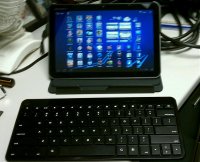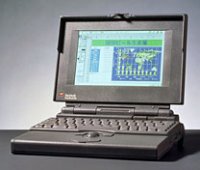Tilted
..
The TW app gets less and less impressive each day, as more and more networks force the cable provider to remove their networks from the app. Pretty soon it's just going to be a pretty TV Guide app.
There are no doubt legal issues with interpreting existing contracts (between content creators/providers and content distributors). And, the networks are of course going to try to argue that cable companies aren't entitled (under current contracts) to allow users to view their content this way, just as the cable companies are going to argue to the contrary. I'm obviously not familiar with the exact wording and terms of the contracts, but my guess would be that the cable companies are more right.
That said, those legal issues are temporary. Those contracts aren't permanent. As is usually the case, new contracts will take into account the capabilities of new technologies. So, interpretation issues will go away as relevant terms are agreed to by the parties. The networks just want to get paid more. They likely will be able to squeeze out a little extra in exchange for allowing cable companies to provide this flexibility to customers. But, it'll be a win-win for everyone - customers will have greater flexibility at a relatively small marginal cost. I'd guess that early on, they'll be an optional charge that lets end customers choose to have this ability. But, eventually, it will just be part of the package - what's expected from content distributors. This is the direction in which content delivery is going - great flexibility and consolidation (read: cost efficiency) of the pipelines (as regards different content types).
This is what I was talking about a year ago when I spoke of how much these kinds of devices were going to change the way we do things (for the better). Content interaction is improving, and will continue to, and adapting itself to fit people, rather than people having to adapt themselves to fit content interaction (i.e. the delivery of content). These devices are a culmination, of sorts, of a long evolution. They are the realization of what various media delivery/interaction devices/forms - TVs, mp3 players, laptops, phones, book cases, magazine racks, game systems, DVD players, notepads - have always wanted to be. Those things obviously won't all be replaced in the short term, as they still offer some advantages (and some always will to some extent) and most distribution (and revenue) models are currently configured to work with them (and that will take time to change), but we are already seeing the changes. Tablets are revolutionary because, finally, something is 'good enough' with regard to some parameters - relating to the human condition, sensibilities, needs and expectations - to bring it all together and deliver it to us in a way that conforms to us, not vice versa.
Some people thought I was crazy when I said this kind of stuff a year ago, and some probably still do. But, we're seeing it happen (at a pace that even I did not expect), even if many aren't noticing the ground shifting below their feet. Such is the case with revolutions - the majority don't realize what's really going on until they are well under way. Let's see where we're at in 4 or 5 years. The proof of the pudding is in the eating, and most people/industry/entities are still yet to sample this pudding.





 I still detest, and refuse to use unless there's no other option, the trackpad on a laptop computer. I carry a mouse and mouse pad with every one. The reason? My first laptop was (1991) an Apple PowerBook 165c. The trackball, and the arching mouse buttons above and below it on the original PowerBook line (see picture), were, as a touch-typist, implements of such grace and smoothness to me that only such wussy, non-quantifiable terms as grace and smoothness can be used to describe them. The trackball could be rolled with my right or left thumb with a natural, fluid motion from the space bar, either thumb could click just as effortlessly, and I could click and hold with the heel of my right palm while rolling with the thumb! If I weren't so old now I might orgasm just remembering it!
I still detest, and refuse to use unless there's no other option, the trackpad on a laptop computer. I carry a mouse and mouse pad with every one. The reason? My first laptop was (1991) an Apple PowerBook 165c. The trackball, and the arching mouse buttons above and below it on the original PowerBook line (see picture), were, as a touch-typist, implements of such grace and smoothness to me that only such wussy, non-quantifiable terms as grace and smoothness can be used to describe them. The trackball could be rolled with my right or left thumb with a natural, fluid motion from the space bar, either thumb could click just as effortlessly, and I could click and hold with the heel of my right palm while rolling with the thumb! If I weren't so old now I might orgasm just remembering it!  But I suppose the real estate occupied by the bottom of the ball was just too valuable, and Apple dropped it for the trackpad when the newer line of laptops came out. DAM THEIR ROTTEN SOULS TO H-LL!
But I suppose the real estate occupied by the bottom of the ball was just too valuable, and Apple dropped it for the trackpad when the newer line of laptops came out. DAM THEIR ROTTEN SOULS TO H-LL!

